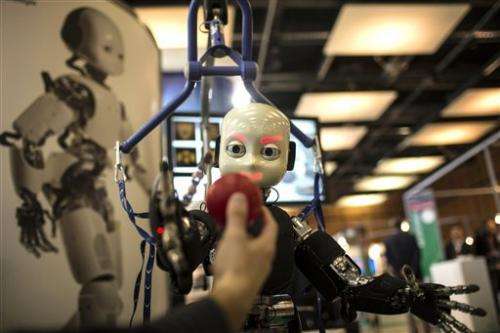US study: Split views on robots' employment role

In 2025, self-driving cars could be the norm, Americans could have more leisure time and goods could become cheaper. Or, there could be chronic unemployment and an even wider income gap, human interaction could become a luxury and the wealthy could live in walled cities with robots serving as labor.
Or, very little could change.
A new survey released Wednesday by the Pew Research Center's Internet Project and Elon University's Imagining the Internet Center found that, when asked about the impact of artificial intelligence on jobs, nearly 1,900 experts and other respondents were divided over what to expect 11 years from now.
Forty-eight percent said robots would kill more jobs than they create, and 52 percent said technology will create more jobs than it destroys.
Respondents also varied widely when asked to elaborate on their expectations of jobs in the next decade. Some said that self-driving cars would be common, eliminating taxi cab and long-haul truck drivers. Some said that we should expect the wealthy to live in seclusion, using robot labor. Others were more conservative, cautioning that technology never moves quite as fast as people expect and humans aren't so easily replaceable.
"We consistently underestimate the intelligence and complexity of human beings," said Jonathan Grudin, principal researcher at Microsoft, who recalls that 40 years ago, people said that advances in computer-coding language were going to kill programming jobs.
Even as technology removed jobs such as secretaries and operators, it created brand new jobs, including Web marketing, Grudin said. And, as Grudin and other survey responders noted, 11 years isn't much time for significant changes to take place, anyway.
Aaron Smith, senior researcher with the Pew Research Center's Internet Project, said the results were unusually divided. He noted that in similar Pew surveys about the Internet over the past 12 years, there tended to be general consensus among the respondents, which included research scientists and a range of others, from business leaders to journalists.
Respondents in this latest survey generally agreed that the education system is failing to teach the skills that students need for the future. Smith said some survey respondents criticized the system for promoting memorization of tasks rather than creativity, teaching a "Henry Ford education for a Mark Zuckerberg economy."
Also, Smith said, some respondents concluded that jobs that don't require specifically human traits—such as empathy, ingenuity or resourcefulness—are at risk for being replaced, including low-skill blue collar jobs or even white-collar jobs that have people performing repetitive tasks.
Respondents offered a few theories about what might happen if artificial intelligence takes over some positions and fewer jobs are created.
Judith Donath, a fellow at Harvard's Berkman Center for Internet and Society, foresees chronic mass unemployment with the wealthy living in "walled cities, with robots providing the labor."
Some respondents see people returning to small-scale, handmade production, and an appreciation would grow for products with the "human touch." Others thought people could also face abundant leisure, allowing them to pursue their personal interests.
Stowe Boyd, lead analyst on the future of work at Gigaom Research, said if, as he predicts, widespread joblessness comes to pass, humanity would have to confront its deeper purpose.
"The fundamental question lurking behind all of this is 'what are people for?'" Boyd said.
For this survey, Pew posed closed- and open-ended questions to technology experts—researchers, futurist and tech developers—and other interested parties, including writers and business leaders, about how far they expect robots and artificial intelligence to grow, and what the impact will be on jobs by 2025. The study was not representative of a particular group of experts, only of those who chose to respond.
© 2014 The Associated Press. All rights reserved.


















